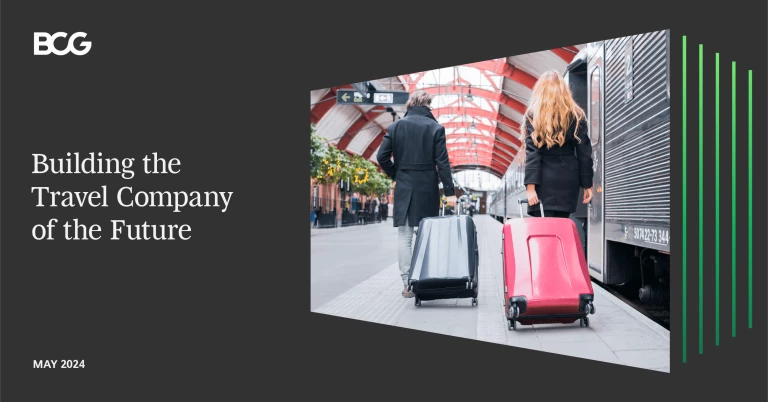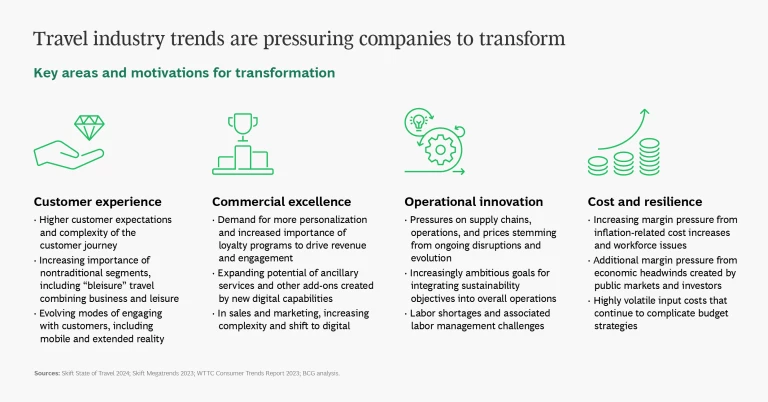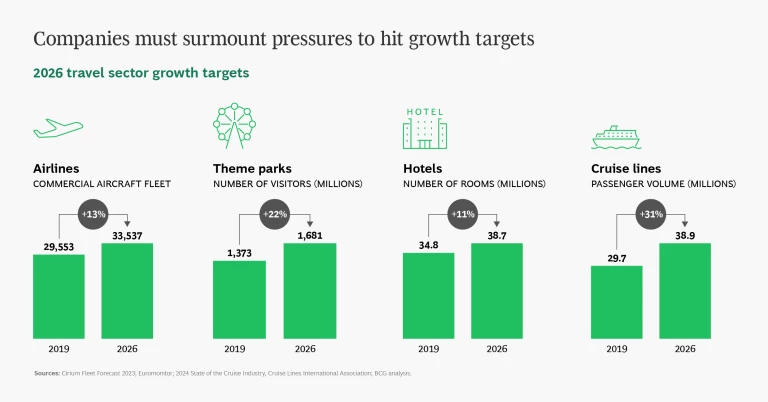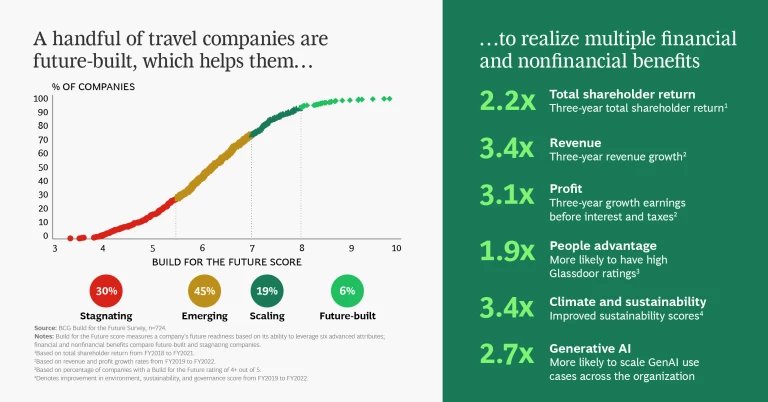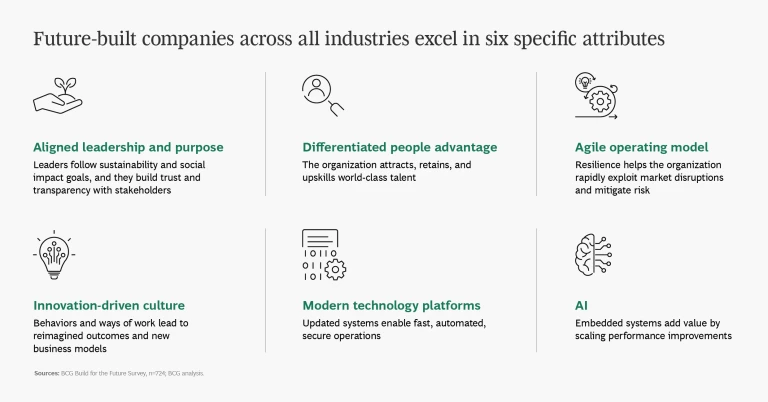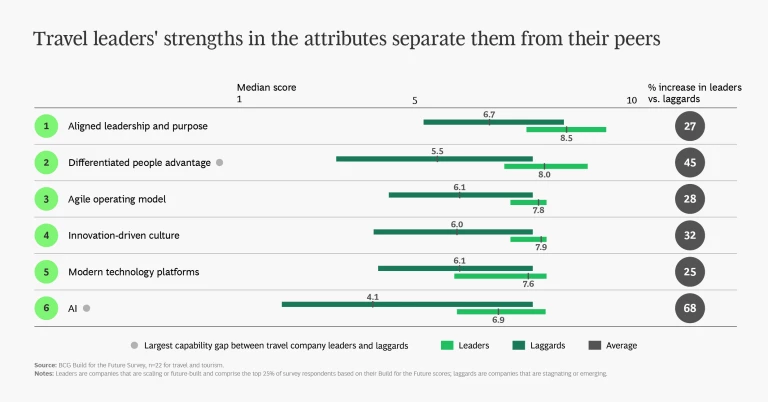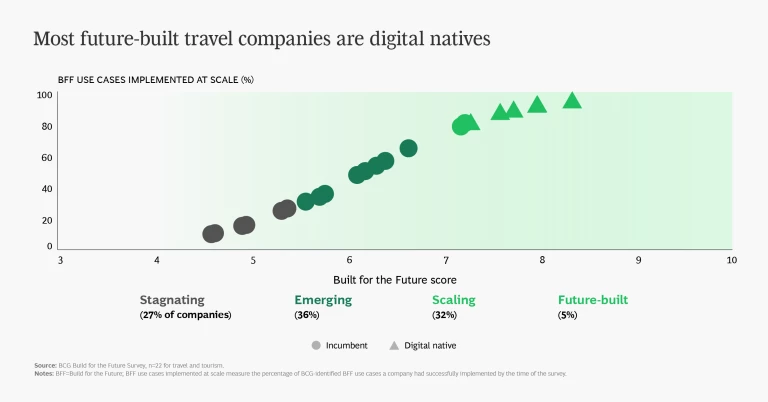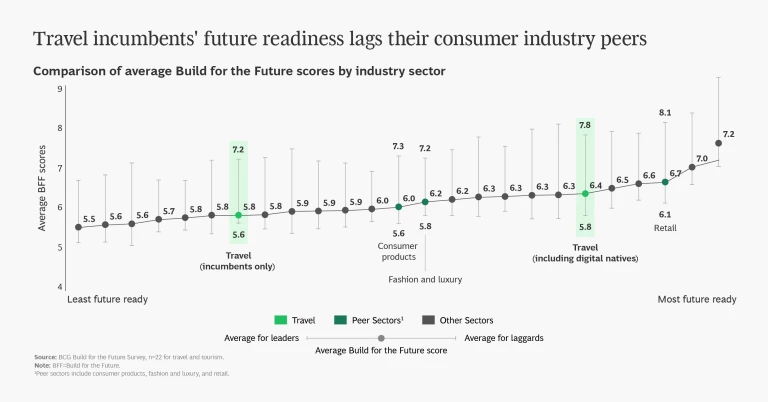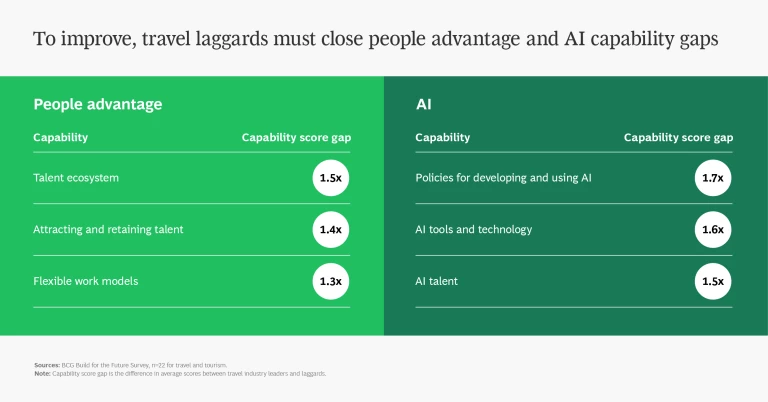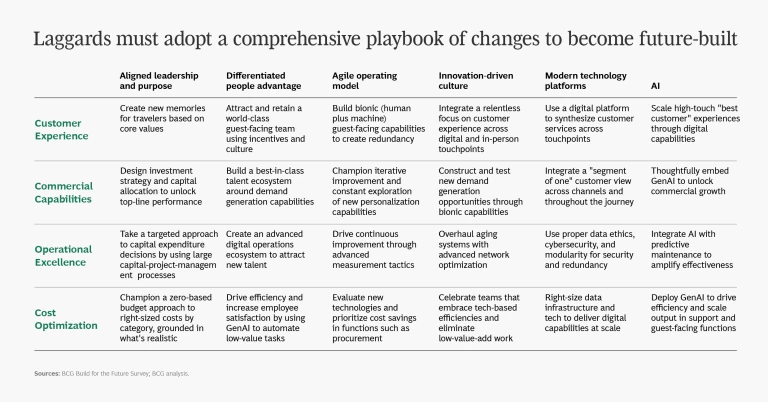The following insights are part of BCG’s Build for the Future series, based on three years of research conducted on digital transformations at major organizations around the globe.
Planning a trip once meant consulting a guidebook or working with a travel agent. Today, people may plan a getaway based on a TikTok influencer’s recommendation, an online review, or a personalized ad fed to them by an algorithm.
These and other evolving consumer behaviors, coupled with cost pressures, are redefining competition in the travel business and the capabilities needed to succeed. As a result, the travel industry is facing challenges in all sectors, including airlines, hotels, theme parks, and cruise lines. The challenges are especially acute for long-time incumbents playing catch-up with digital natives.
Against this background of change, a handful of travel companies are thriving. According to our Build for the Future survey, the most forward-thinking travel businesses share a number of common attributes. These traits allow them to excel regardless of customer or market pressures and produce financial and nonfinancial outcomes that outshine those of their peers. (See “Build for the Future.”)
Build for the Future
Our latest survey asked all participants about:
- Five areas that are fundamental to success
- The emphasis of transformation efforts
- How successful transformation efforts have been
- The degree to which each of more than 50 potential influencing capabilities were in place
From this research, we identified the path that companies must take to become built for the future. We’ve reconciled the challenge of what these companies need to do (identifying which initiatives drive the most value by sector) with the challenge of how to do it (determining which capabilities drive success and how to build them fast). CEOs can tailor this new playbook to their company-specific change agendas.
At a Glance
Our Build for the Future survey identified a small cadre of companies we refer to as “future-built,” with attributes that make them more ready than their peers for what’s on the horizon. These traits include: aligned leadership and purpose, differentiated people advantage, agile operating model, innovation-driven culture, modern technology platforms, and AI.
Future-built travel companies use these attributes as a springboard to improve their performance in four specific areas:
- Customer Experience. They elevate travel experiences by designing seamless, digital-first customer journeys, enhancing touchpoints, and reimagining loyalty to foster lasting connections.
- Commercial Excellence. They sharpen their competitive edge by using dynamic pricing and revenue management strategies, crafting tailored marketing narratives, and accelerating growth through digital sales channels.
- Operational Innovation. They infuse operations with digital agility, they forecast and preempt maintenance needs, and they execute capital projects with precision to redefine operational excellence.
- Cost and Resilience. They employ a holistic view of managing costs, embed zero-based budgeting principles, and streamline procurement to lift efficiency and instill resilience.
Among the 24 industries analyzed in our Build for the Future research, travel is one of the more advanced when it comes to being ready for the future. That’s primarily because of the advanced practices used by digital newcomers. Long-time travel players, however, trail the majority of incumbents in comparable consumer-facing industries when it comes to future readiness. In particular, travel incumbents lag in adopting innovation-driven cultures and cultivating a differentiated people advantage.
Read the slideshow to learn more about the survey findings.
Focusing on People and AI
The difference between travel industry leaders and laggards is particularly acute in two areas:
Differentiated People Advantage. Travel industry leaders have an edge in upskilling existing personnel and attracting and retaining new talent, which allows them to offer customers a better experience booking travel or taking a trip. Leaders in the hospitality sector of the travel business, for example, improve hiring and retention through continuous benchmarking to ensure that compensation is equal to or above that for comparable jobs in other industries, and by offering flexible schedules. Hospitality leaders also support diversity and inclusion. They also target messaging, outreach programs, and other actions to appeal to specific groups of current, past, and prospective employees.
AI. Travel industry leaders deploy advanced analytics and AI throughout the travel value chain. By optimizing their supply chain and offering hyper-personalization, these bionic companies successfully combine human and advanced technology capabilities, gaining a competitive advantage that can take a variety of forms. During severe weather, airlines use these capabilities to minimize customer travel disruptions by selecting the next best flight schedules. Cruise lines use their combined people and advanced technology capabilities to fine-tune pricing during cruise booking periods to maximize occupancy and revenue.
How Travel Industry Incumbents Can Catch Up
To become future-built travel businesses, companies might consider the following moves to foster the six winning attributes we’ve identified:
Aligned Leadership and Purpose. Leadership is central to becoming future-built. Companies in industries of all types with a systematic and well-supported approach to activate leaders see transformation success rates that are three times higher than those of their competitors. Leaders at these companies reimagine and reinvent the business to serve all stakeholders, inspire and enrich the human experience, and execute and innovate through supercharged teams.
Differentiated People Advantage. Combine people and machines for a new model of customer service excellence. Use generative AI’s (GenAI) emerging power to equip frontline staff with behavioral nudges and as support for personalized customer interactions.
Agile Operating Model. Build a minimum viable operating model to support innovation and establish an innovation flywheel. Such a learning loop increases a company’s chances of building the next game-changing product or service and decreases the time needed to bring digital products to market.
Innovation-Driven Culture. Create an innovation-focused culture that embraces risk, fosters collaboration, and grants autonomy to internal teams. Then, use that culture to put customer experience at the heart of everything you do.
Modern Technology Platforms. Ensure that efforts to establish data platforms and modernize core systems start at the top, in the executive suite. Guide modernization initiatives with a rigorous focus on business outcomes. Work backward from the outcome you want to achieve, analyzing the data that has to be liberated and the systems that have to change to accomplish your goals.
AI. Use the excitement generated by GenAI to invigorate AI transformation programs, especially for managing revenue, managing operations, and personalizing customer interactions.
Call it the Instagram effect. People influenced by what they see on social media have higher expectations for travel and the services they get from the travel companies they work with. By cultivating superior people practices and an innovation-based culture, travel laggards can catch up with industry leaders and provide the services that customers want.

